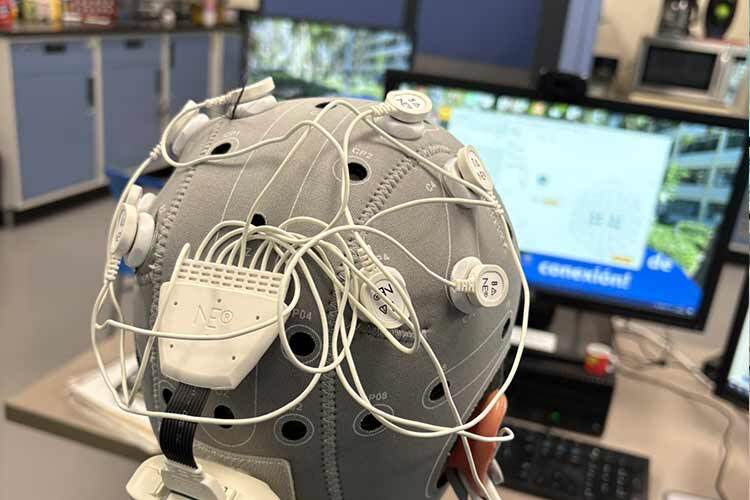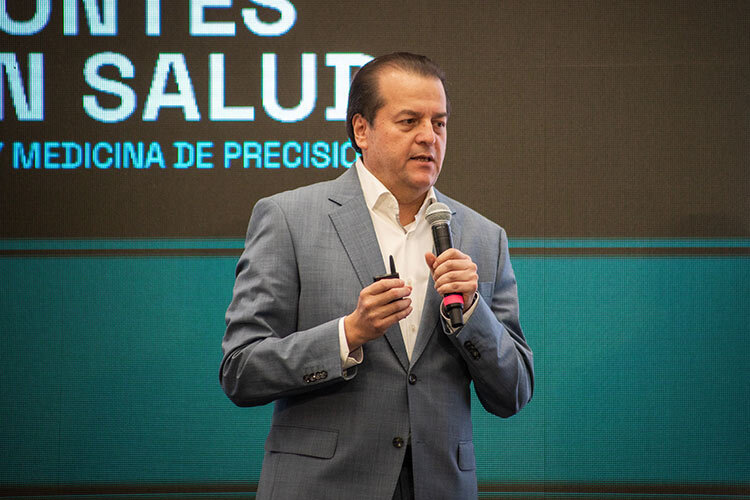Although he’s not entirely sure why, Carlos Aguilar Salinas always wanted to study medicine. His parents had a photo of him dressed up as a doctor when he was four.
“I don’t know where the idea came from; I think it was more instinct than anything,” says the doctor, endocrinologist, and researcher in an interview with TecScience.
Although he didn’t know it at that age, becoming a doctor would eventually stop being a game and turn into a vocation. He currently devotes his time to studying and treating metabolic diseases such as type 2 diabetes and dyslipidemia.
Over the course of his career, he has managed to identify genetic variants in the Mexican population that predispose them to these conditions, conduct epidemiological cohort studies to understand their progress, and propose evidence-based solutions.
The specificity of what he’s studying probably came about after a biochemistry class he had in high school, which was taught by Juan José Hicks. In the final examination, he had to explain how a glucose molecule turns into an ATP one, which is the greatest source of energy in living beings.
An academic exercise that most of us would find overwhelming, especially at that age, seemed exciting to him. “Incorporating all that information was very appealing,” he says.
He is now Director of Research at the Salvador Zubirán National Institute of Medical Sciences and Nutrition.
Aguilar has cracked the formula that enables him to combine treating patients, doing basic and clinical research, and performing administrative roles at different institutions.
His career has led to him being recognized with the Mexican prize, the National Science Award in 2018 in the Physical, Mathematical, and Natural Sciences category.
The boy in the photo would surely be proud.

Combating Metabolic Diseases Through Research
According to him, one of his greatest contributions −in collaboration with other researchers− to the study of these types of disease has been in the area of familial hypercholesterolemia.
This is a hereditary condition that affects how the body processes low-density lipoprotein (LDL) cholesterol, known as “bad cholesterol,” resulting in those who live with this condition accumulating it to excess and having a greater risk of presenting heart complications.
With his team, he set up the Mexican register of this disease, whose data form part of a consortium coordinated by the European Arteriosclerosis Society, which has compiled nearly 80,000 cases.
“This has served to discover time trends of the disease and generate specific treatment and attention protocols,” he explains.
Another of his greatest accomplishments has been identifying early-onset type 2 diabetes as a problem of national importance in Mexico.
Currently, 28% of cases of the disease in the country start before the age of 40, which is considered unusual as this condition tends to appear at more advanced ages.
“These people have a greater risk of developing chronic complications and kidney and retinal damage,” he says.
By studying people who develop it early, he and his team identified a variant of the SLC16A11 gene as one of the genetic bases for the phenomenon.
Their studies, which are still ongoing, have also thrown light on the reasons why it appears early in certain people, why they present more complications, and how it could be prevented.
Identifying Genetic Variants Behind Mexican Predispositions
Throughout his career, he has managed to identify genetic variants that predispose the Mexican population to developing conditions that affect their metabolism.
One of their first discoveries was that a variant of the SLC16A11 gene, which was later associated with early-onset type 2 diabetes, leads to those who present it having low levels of high-density lipoprotein (HDL) cholesterol, known as “good cholesterol.”
High levels of HDL cholesterol are related to a lower risk of developing cardiovascular and metabolic diseases.
Regarding this variant, one of the most peculiar findings was its evolutionary origin. “We found that it comes from Neanderthal genes,” he says.
These discoveries were later linked to the case of an 85-year-old patient with familial hypercholesterolemia who hadn’t presented any complications. “The prognosis of a person with this condition at that age would have been to have had at least one heart attack,” says Aguilar Salinas.
By studying him and his family, they realized he had a variant that elevated the amount of HDL cholesterol in his blood.
Having identified these variants underscores his commitment to contributing knowledge and infrastructure for attending to some of the diseases that most affect Mexicans.
“If we don’t study how our ethnicity determines the disease, no-one else will,” he says. “It’s important to generate world-class research with a local focus.”

The Many Faces of Diabetes and Obesity
With his experience, Aguilar Salinas has realized that there is no single type of diabetes.
“Although everyone with diabetes has the same disease, their prognoses can be very heterogeneous,” he says.
For some people, this condition starts at the age of seventy and when they die, this is not due to the disease. In other cases, complications develop very quickly.
The same thing happens with obesity; there are people who have obesity their whole lives and have no metabolic complications, while others do. There are people whose metabolism is unaffected, but they have orthopedic problems.
Recently, he and his group have collaborated with Imperial College London to analyze the different ways in which this condition manifests in different countries around the world.
“In Mexico, it’s not the same to be obese at 30 as it is at 80,” he said during his talk at the third International Conference on Obesity Research. “We should also have a focus on gender and special groups.”
According to the researcher, obesity can be classified in different ways, such as the zone of the body in which most adipose tissue builds up or whether there are comorbidities.
In our country, when this condition starts at an early age, complications such as dyslipidemia or arterial hypertension tend to appear, while type 2 diabetes prevails when it starts at an advanced age.
That’s why we need to go into detail on the different ways it manifests to really confront the problem.
Food Labeling Is Not Enough
In the expert’s opinion, a multidisciplinary focus is needed in Mexico that attacks the different factors behind obesity and metabolic diseases to successfully combat them.
Also needed are a holistic vision, precision medicine, and cross-cutting plans from government that don’t change from one administration to the next.
Although front-of-package labeling and taxes on sugary drinks seem to be successful public policies, they don’t go far enough, as they don’t consider the different subtypes and causes of overweight and obesity.
The way the issue is communicated also needs to change, eliminating stigmatizing images of people with obesity and replacing them with messages of empowerment.
“Although everyone knows that eating unhealthy food or not doing exercise is bad for you, but many people keep doing it,” he says.
That’s why we need programs that focus on making a change in people’s behavior, when the origin of their condition is due to lifestyle choices.
“For most people, obesity and metabolic diseases shouldn’t lead to disability or death,” he says. “We live at a time when we have the resources and information to prevent these from becoming a burden in their lives.”
Did you find this story interesting? Would you like to publish it? Contact our content editor to find out more at marianaleonm@tec.mx.


















